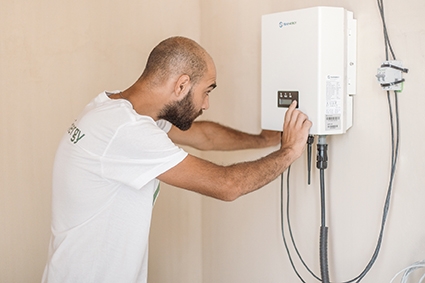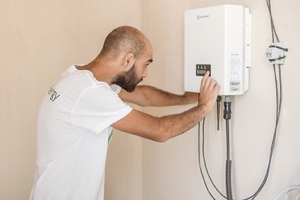Energy Efficiency: The Sleeping Giant of Climate Mitigation
With climate change a huge concern for the future, discussions often revolve around the reduction of gas emissions rather than how societies can save energy. However, energy efficiency is a method that not only tackles environmental issues by minimizing energy consumption, it also brings about positive changes in health, education and the economy.
From 11 - 13 February, EU4Energy and the International Energy Agency (IEA) held a EU4Energy policy forum, focusing on energy efficiency in buildings. Bringing together experts and policymakers from around the world, attendees were able to expand their knowledge and draw on experiences from other countries in the region. GEORGIA TODAY sat down with speakers Armin Mayer and Brian Dean from IEA to discuss energy efficiency in Georgia and the world.
Energy efficiency has the potential to save both energy and money in various areas. For example, on a government level. Many countries, including Georgia, heavily subsidize energy. Energy efficiency therefore offers an opportunity to lower subsidies without transferring the cost to consumers. “The government is heavily involved in the traditional energy sector,” says Mayer. “Energy efficiency is a smarter way for the government to be involved. There’s this notion that for energy efficiency to work, the government has to step in and offer incentives, which is true to a certain extent.” He continues. “However, governments are subsidizing fossil fuels as well.”
Consumers should also be informed about the advantages of energy efficiency. It’s important that the market and consumer behavior changes to profit from the possibilities of energy efficiency and the money it can save in the long term. “Most countries are hovering just above the least available technologies because that’s what consumers see,” says Dean. “Consumers buy something that’s less efficient if they don’t have more information.” Tactics such as energy efficiency labels help to educate and change behavior. “If consumers can see they’re getting a product that can save them energy and therefore money, they’re more likely to buy it. That’s a real opportunity in Georgia.”
Despite its advantages and potential savings, energy efficiency has often been neglected as an effective method to reduce energy consumption. “There’s a massive untapped potential that’s invisible to most people,” says Mayer. “It [energy efficiency] doesn’t get the credit it deserves.”
For example, Tbilisi’s Mayor, Kakha Kaladze, last week reiterated his promise to replace khrushchovka Soviet-era apartment blocks in Tbilisi with little consideration of the energy that was spent to build the original blocks and that will be used to construct new apartments.
If the khrushchovka are structurally sound, they are still salvageable and there are ways of making them more liveable in an efficient way. “With Soviet-era buildings, maybe there’s a psychological desire to change them, but there’s also an opportunity,” says Mayer. “Because they’re all very similar, you can do a cost-effective makeover. You can make them look beautiful and be efficient in a clever way, you just have to use imagination. That’s an opportunity, I think.”
The Adjara Group has demonstrated how Soviet buildings can be successfully transformed into liveable spaces. “We’ve stayed in interesting hotels in Tbilisi that have been completely renovated,” says Dean. “I’ve been in lots of buildings around the world that have been refreshed and made to be useful, beautiful and efficient.”
One of the biggest challenges facing energy efficiency in Georgia and around the world is its enforcement. Georgia must not only implement new policies to ensure that energy efficiency is incorporated into building regulations from the very beginning, but also enforce these regulations. “There needs to be an occupancy permit,” says Dean, “if you don’t have an occupancy permit in the construction process, then it’s hard to do any enforcement at all.”
Energy efficiency results do not happen overnight. “We show charts that go back to the 60s and 70s because that’s how long it sometimes takes to show results,” says Mayer. However, with better education, policy, and enforcement, energy efficiency offers Georgia a chance to simultaneously improve living standards and help the environment. The EU4Energy and IEA are working together to educate policymakers on its huge potential. “We believe that policymakers in Georgia have the tools and there’s an opportunity to make it happen here,” concludes Mayer.
The EU4Energy Initiative covers all EU support to improve energy supply, security and connectivity, as well as to promote energy efficiency and the use of renewables in the Eastern Partner countries Armenia, Azerbaijan, Belarus, Georgia, Republic of Moldova and Ukraine. It does this by financing projects and programmes that help to reform energy markets and to reduce national energy dependence and consumption. Over the longer term, this makes energy supply more reliable, transparent and affordable, thus reducing energy poverty and energy bills for both citizens and the private sector. Find out more: www.eu4energy.eu
By Amy Jones
Image source - (c) European Commission












